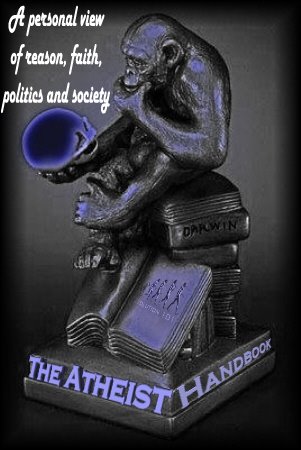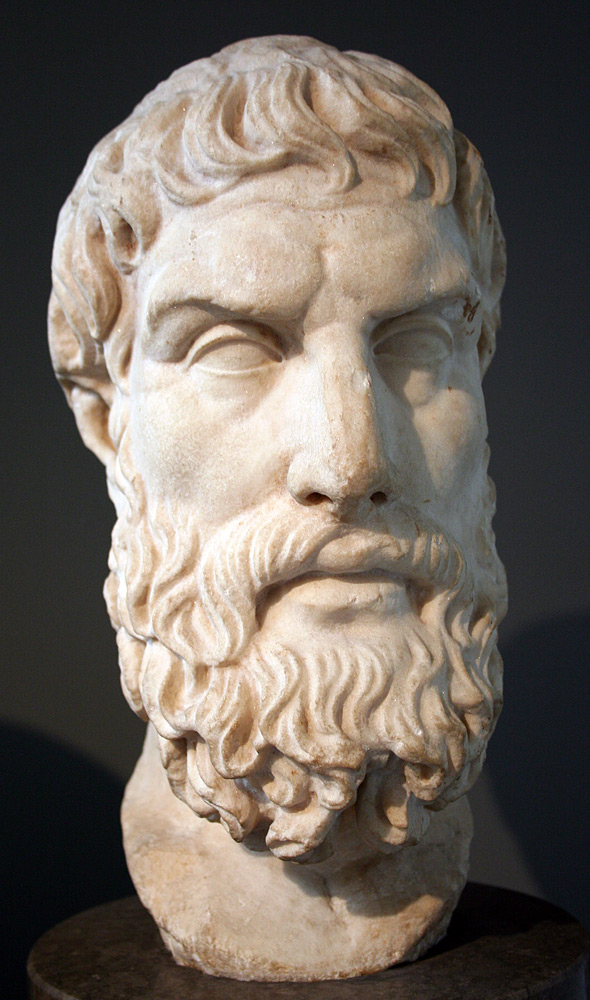
If we go back to the beginning we shall find that ignorance and fear created the gods, that fancy enthusiasm or deceit adorned them, that weakness worships them, that credulity preserves them and that custom respect and tyranny support them in order to make the blindness of men serve their own interests.
-Baron d'Holbach
What IS it with some Christians? They just can't leave you alone. They just can't. At some point, they figure it was their mission in life to run about and try to get as many converts as possible. I actually wonder if these people think there is some kind of heavenly tote board where Jesus keeps track of how many converts each Christians gets. "Oh look, Bob got two more. But Suzie here, hasn't had a single convert this week! She'd better pick up the slack!"
I mean, what would the winner get anyway? If there was any justice in the universe they'd end up with a T-shirt that said "I converted the heathens and all I got was this lousy t-shirt."
Of course, some of them are pretty open about why they cannot leave the rest of us alone. They say, with that creepy Barney the Dinosaur smile on their faces, things like "You know, if you see a hungry person, and you knew what it was like to go hungry, wouldn't you want to feed them? That is all I am doing." Yeah, well, Jesus-Boy, guess what? I'm not hungry! And even if I was, I ain't buyin' what you're selling!
Naturally, someone of them, when you really get angry after they have been on your metaphysical ass like a cop on donuts, will appologize. "I'm not perfect," they'll say. "We're all sinners you know. I include myself in that too. I'm a sinner too, that's why we need Jesus." Excuse me, but maybe you believe you were born a worthless sinner who has to pay the price for the alleged "sin" of Adam - which amounted to free thinking if you really consider the story - but some of us have a little more self respect than that. Putting aside the story is nothing but a myth for a moment, why does anyone think saying "I'm a sinner too" qualifies as an excuse for being an ass?
Ok, by now you can tell I am rather annoyed, and this post is not really of the same quality of my usual fair here on the handbook. But have you ever had a day where you just have had enough? Today was one of those for me. So you theists with porcelain sensibilities, stop reading now. I've duly warned you, so if you get all offended and weepy after this...well, we're all sinners right?
Anyway, I am more than used to Christians trying to convert me. They've been trying most of my life and at this point nothing much surprises me. I've heard it all. Over the last few weeks, for reasons that escape me, my videos on Youtube, and my blog here, have resulted in a wave of believers all attempting, desperately, to show me how wrong I am and just how much I need this Jesus guy. They tell me atheism is a tool of the Satan. (Hint to Christians: I'm an atheist If I don't believe in a god, why the hell do you think appealing to a devil is going to carry any weight? Think about it.) They tell me how much Jesus loves me. They threaten me with eternal torture in hell. (Another Hint: Again, don't believe in Jesus or a hell so...gah, why do I bother?) Others try the usual arguments from design and arguments from morality. These are easily dispensed with, but I will at least give them props for trying something that doesn't sound insane....because insane is what I often get. Consider this gem from a Youtuber who tries to argue...well, I am not sure what he is trying to argue, truth be told:
In order for something to be faith there must be less evidence. In old times God actually spoke to man, and showedhim great works, the more unpure man became the less God could talk them,makes sense when you thik about pure energy and bad energy. Or like this car radio waves versus traffic sounds that have other radio n waves or honking there horns.
If spirit means constant energy,and whhen you break everyuthing to an atom, and it sees u and it turns invisble and stops blinking,that is remnance of a spiritual thing that made everything,because it leaves behind a constant energy.
Which would mean that is the remnance of Gods energy.
And if God is energy he stays constant and can manipulate other energies,also he can be asexual which is why he can create things,
energy can't be destroyed, like static electricity, can be produced in many things
And if sin= inhereted bad genes, wickedness, and sickness,or bad genes you can pass down.
Makes since why there is sickness
Stuff like this really does make me fear for the future of the species.
Now, before I go on, let's make something clear from the outset. My blog and my videos are open for anyone to comment, even if their comments make it sound as though they allow Mike Tyson to use their brains as a punching bag. By putting my views out there, I open the door, deliberately, to the views of others. This is the way it is, and I encourage it. I even encourage views I don't like particularly. That's really the whole point in writing the essays I do, and make the videos I do. So while someone trying to get me to become a Christian by telling me I am a puppet of the devil is barking mad, in putting my opinons out there, I have to tolerate a certain level of, shall we say, unique opinons. Fortunately, for every screwball who thinks quoting bible versus at me actually works there is often a more thoughtful theist who, while I probably won't agree with them, at least as something interesting to say.
However, there are areas of ones' life where you think the believer with the evangelical itch would be able to restrain themselves. You know, like the mail. My mail. As in, mail I send to other people.
But alas, like the god of the Old Testament, some believers have a very serious impulse control problem.
I sent some Xmas presents to my mother and step father via UPS. (yes, I just wrote Xmas instead of the Jesusmas thing. Why? Because I feel like being a gadfly. nah nah nah.) When the package arrived it had on it a nice, friendly sticker some UPS employee though worthwhile to place on it. It read, in bright friendly letters: GOD LOVES YOU.
Oh really? Does god also realize I don't want him on my goddamn mail? I can only assume that the UPS employee who thought it was totally appropriate to use my mail as a tool to proselytize to the person I was sendingto it is the "just feeding the hungry, we're all sinners so I can do whatever the hell I want" variety. Or maybe it's the "I love you, so I don't want you go to hell, so I am going to do whatever I can to save you." Or maybe he or she is one of those really insipid gotta-convert-the-heathen-types who actually believe if you read the right bible passage to someone at the right time, the clouds will part, a beam of light will fall upon the head of the non-believer and to a chorus of angels singing Hallelujah, the heathen is converted!
Either way, I just don't give a crap. Believe it all you want. I don't really care about that either. But do not, I repeat NOT, put it on my mail. DON'T DO IT.
Look, I am pretty passionate about philosophy, politics, science and atheism (even though I think the term atheism itself is pretty silly...but that is for another, less ranty day.) But you don't see me sticking quotes from Richard Dawkins or Bertrand Russell on random stranger's mail now you do? I don't inavde your personal space with my philosophical views. You are chosing to read this of your own accord. You can stop reading whenever you bloody well please. In fact, even the most so called "fundamentalist atheist" (Another hint to believers: the phrase fundamentalist atheist is a contradication in terms and makes you sound ridiculous. If you investigate why some Christians call themselves "fundamentalists" you'll understand why.) would not put an atheist sticker saying "Christopher Hitchens loves you" on your mail.
But not this beleiver. Oh no. He thought it was prefect okey dokey to use someone else's mail to try and win a convert. I mean, I use UPS for business as well. I wonder if this slap happy Mensa group brainiac ever paused to think of the possible consquences of doing that. What if I was sending a resume to prospective employeer, who gets my packet and sees in happy letters reading GOD LOVES YOU on it? Somehow, I doubt leaving an impression of being a rabid bible thumper is the best way to impress a possible new boss. Not that our fundy friend in UPS cares. He's saving souls after all right?
Now, I know what you might be thinking. "Jesus, Grant. It's just a fucking sticker. Mellow out dude. Have a cheeto." And maybe you have a point. Then again, why should I tollerate this sort of invasion into my personal and private space? Why should anyone? Because someone, somewhere thinks the words "it's my faith" is some kind of get out jail free card? There is no justification for it, no matter what Mad God Sticker What God Sticks At Midnight thinks. (A obscure Tick reference there for those in the know.) At best it was unproffesional. Fortunately, a very helpful chap at UPS customer service though so too when I called and is doing whatever UPS does when this sort of thing happens.
So now I have to wonder if the god sticker guy will fess up if he caught? You know, bearing false witness and all that jazz? And if he does, what will his excuse be? Somehow I would not be surprised if as a defense, the phrase "we're all sinners you know," passes his lips.
Gah. What IS it with some Christians anyway?























